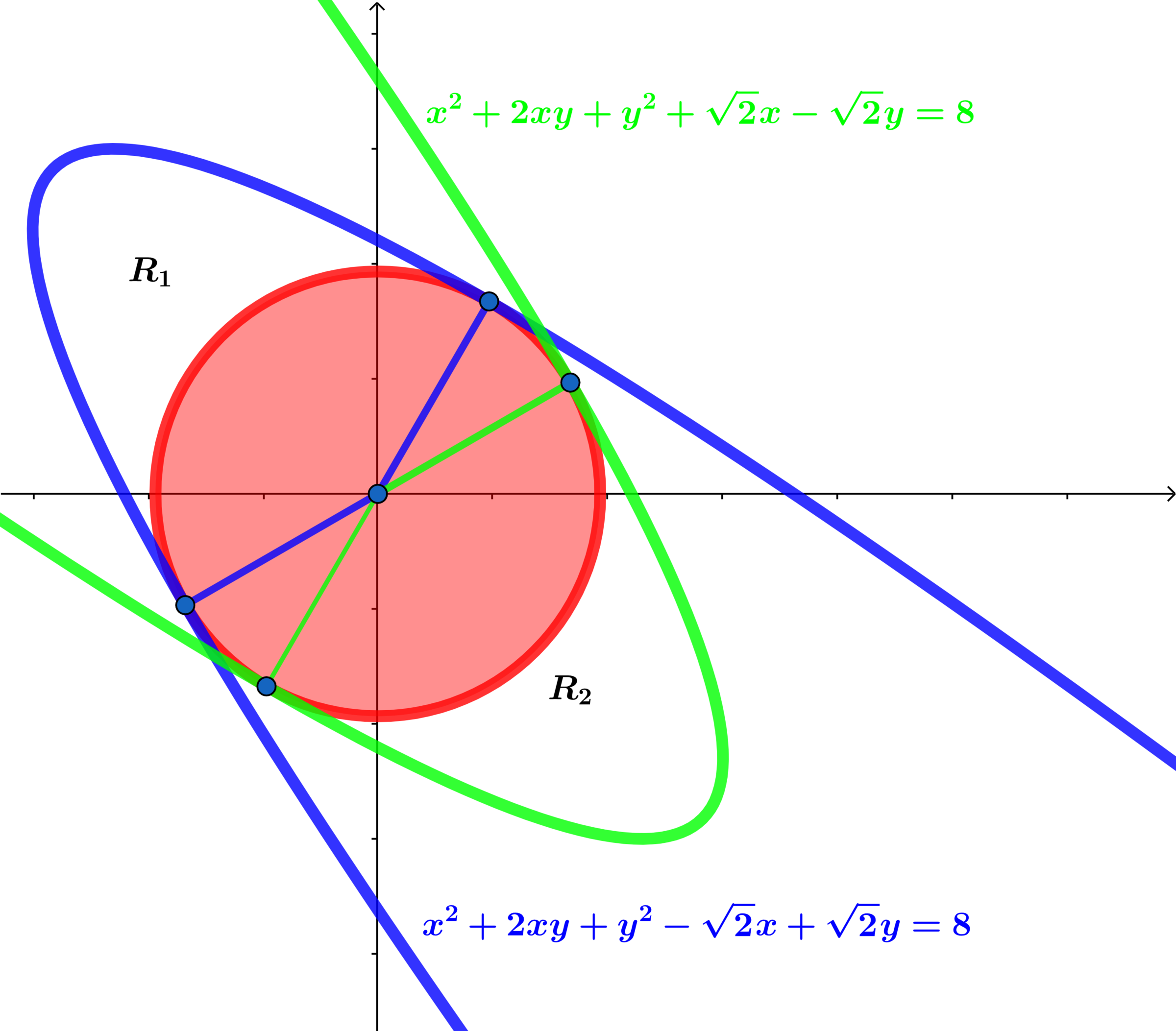Circle inscribed in two intersecting parabolas

The circle centered at the origin ( 0 , 0 ) is inscribed in the two curves
x 2 + 2 x y + y 2 − 2 x + 2 y = 8 and x 2 + 2 x y + y 2 + 2 x − 2 y = 8
Let A T be area of R 1 + R 2 , where R 1 is the region between x 2 + 2 x y + y 2 − 2 x + 2 y = 8 and the inscribed circle and R 2 is the region between x 2 + 2 x y + y 2 + 2 x − 2 y = 8 and the inscribed circle.
If A T = b a d c − d b e arcsin ( b e c d ) , where a , b , c , d and e are coprime positive integers,
find a + b + c + d + e .
The answer is 48.
This section requires Javascript.
You are seeing this because something didn't load right. We suggest you, (a) try
refreshing the page, (b) enabling javascript if it is disabled on your browser and,
finally, (c)
loading the
non-javascript version of this page
. We're sorry about the hassle.
( 1 ) : x 2 + 2 x y + y 2 − 2 x + 2 y = 8
( 2 ) : x 2 + 2 x y + y 2 + 2 x − 2 y = 8 .
The equations of rotation are:
x = x ′ cos ( θ ) − y ′ sin ( θ ) and y = x ′ sin ( θ ) + y ′ cos ( θ ) .
Since C o e f f ( x 2 ) = C o e f f ( y 2 ) in both curves ⟹ θ = 4 5 ∘ ⟹
x = 2 x ′ − y ′ and y = 2 x ′ + y ′
( 1 ) ⟹ 2 x ′ 2 − 2 x ′ y ′ + y ′ 2 + ( x ′ 2 − y ′ 2 ) + 2 x ′ 2 + 2 x ′ y ′ + y ′ 2 − ( x ′ − y ′ ) + x ′ + y ′ = 8
⟹ x ′ 2 + y ′ = 4 ⟹ y ′ = 4 − x ′ 2 and similarly for ( 2 ) we have: y ′ = x ′ 2 − 4 .
Using y ′ = 4 − x ′ 2 ⟹ D = d 2 = x ′ 2 + ( 4 − x ′ 2 ) 2 = x ′ 4 − 7 x ′ 2 + 1 6 ⟹
d x ′ d D = 2 x ′ ( 2 x ′ 2 − 7 ) = 0 and x ′ = 0 ⟹ x ′ = ± 2 7 ⟹ y ′ = 2 1 ⟹
D = d 2 = 4 1 5
and d x ′ 2 d 2 D > 0 ⟹ the distance d is minimized when x ′ = ± 2 7
For R 1 :
x ′ 2 + y ′ 2 = 4 1 5 ⟹ y ′ = 4 1 5 − x ′ 2 and y ′ = 4 − x ′ 2 ⟹
A = ∫ − 2 7 2 7 4 − x ′ 2 − 4 1 5 − x ′ 2 d x ′
Let x ′ = 2 1 5 sin ( θ ) ⟹ d x ′ = 2 1 5 cos ( θ ) d θ ⟹
∫ 4 1 5 − x ′ 2 d x ′ = 8 1 5 ∫ 1 + cos ( 2 θ ) d θ = 8 1 5 ( θ + sin ( θ ) cos ( θ ) ) ⟹
∫ − 2 7 2 7 4 1 5 − x ′ 2 d x ′ = 8 1 5 ( arcsin ( 1 5 2 x ′ ) + 1 5 2 x ′ 1 5 − 4 x ′ 2 ) ∣ − 2 7 2 7
= 4 1 5 arcsin ( 1 5 1 4 ) + 4 1 4 ⟹ A = 6 3 1 2 7 − 4 1 5 arcsin ( 1 5 1 4 )
Using symmetry ⟹ A T = 2 A = 3 3 1 2 7 − 2 1 5 arcsin ( 1 5 1 4 ) =
b a d c − d b e arcsin ( b e c d ) ⟹ a + b + c + d + e = 4 8 .